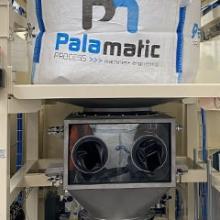Treated powder: black mass
Black mass treatment process
The project: a group specializing in ore processing and metallurgy, plans to build a new pilot plant for research and development purposes. The objective of this pilot plant is to validate the technology and design criteria in order to then consider an industrial scale-up.
The main objective is to define which equipment could be used to unload the black mass from bulk bags, precisely dose and repulp it with water, without clogging reactions or dust emissions from this CMR powder.
“Black mass" is a powder mixture that is obtained after the recycling treatment of a lithium-ion battery. Batteries are made of metals such as lithium, manganese, cobalt and nickel. When a cell/battery no longer works, it is collected, dismantled and crushed.
The crushed material is then processed to produce a "black mass", which contains high amounts of these metals. These critical materials can then be extracted from the black mass and reused in the production of new batteries or in new products and/or applications. Black mass is considered abrasive and toxic and is classified as a CMR product.
The process consists of unloading the black mass powder, packaged in bulk bags, using an EasyFlow®EF2 super sack unloading station. Once the discharge spout has been untied using a glove box, the powder is stored in a buffer hopper. Given the bridging nature of the powder, a flat-bottomed bridge breaker facilitates the gravity discharge. An extraction screw located at the outlet of the bridge-breaker supplies the pneumatic conveying line with a metered flow rate. A gearbox is fixed at the outlet of the screw conveyor to allow the transfer of the product to the cyclone receiver.
The black mass is then continuously metered into the pumping tank at a rate of 3 kg/h. This transfer is carried out via a VF01 pneumatic vacuum transfer cyclo-filter. The powder cyclone receiver feeds a screw feeder, mounted on load cells, ensuring accurate dosing of the powder. The regularity of the metered feed is guaranteed by the agitator shaft that maintains a constant filling rate of the auger. The cyclo-filter is equipped with a pneumatic vibrator to guarantee an even flow of the powder
A liquid (water or equivalent) is continuously added to the top of the pumping tank with the flow rate automatically adjusted to control the solids content. It is important that the black mass leaving the powder feeding equipment is not in contact with humidity in order to avoid any risk of clogging. Despite the hydrophobic nature of the powder, certain particles (graphite in particular) agglomerate on the surface of the liquid if it is stored in a stirred tank.
To overcome clogging problems and exposure of the black mass to humidity, a “Humidity Protection” system provides a barrier for the dispenser from steam ingression that may come from the tank.
Once the black mass is humidified, located in the repulping tank, the sludge then overflows by gravity into a reactor placed under this same tank.
The equipment dedicated to bulk bag emptying and hopper filling operations is designed to prevent any emission of dust into the atmosphere to protect operators.
The black mass solid mixture is a non-homogeneous product composed of both heavy particles and extremely fine and volatile particles.
The design of the bulk bag emptying station allows maximum containment. It is equipped with a glove box which prohibits any contact with the product when opening or closing the super sack. An anti-overflow tube completes the unlacing cabinet. It allows the funneling of the product and prevents the material from overflowing into the glove box.
The whole station is connected to a dust collection unit in order to completely contain the station.
Transporting the powder in bulk bags and the composition of this “mixture” regularly causes the product to solidify. A pneumatic massage device is provided on the emptying station to facilitate the flow of the powders.
Furthermore, the flow of the powder and the regulated supply of the pneumatic transfer line are ensured by the flat-bottomed anti-bridging device coupled to an extraction screw.
A manual sampler completes the emptying station. It is installed on the buffer hopper and allows a small quantity of product to be taken directly from the flow chute.



















